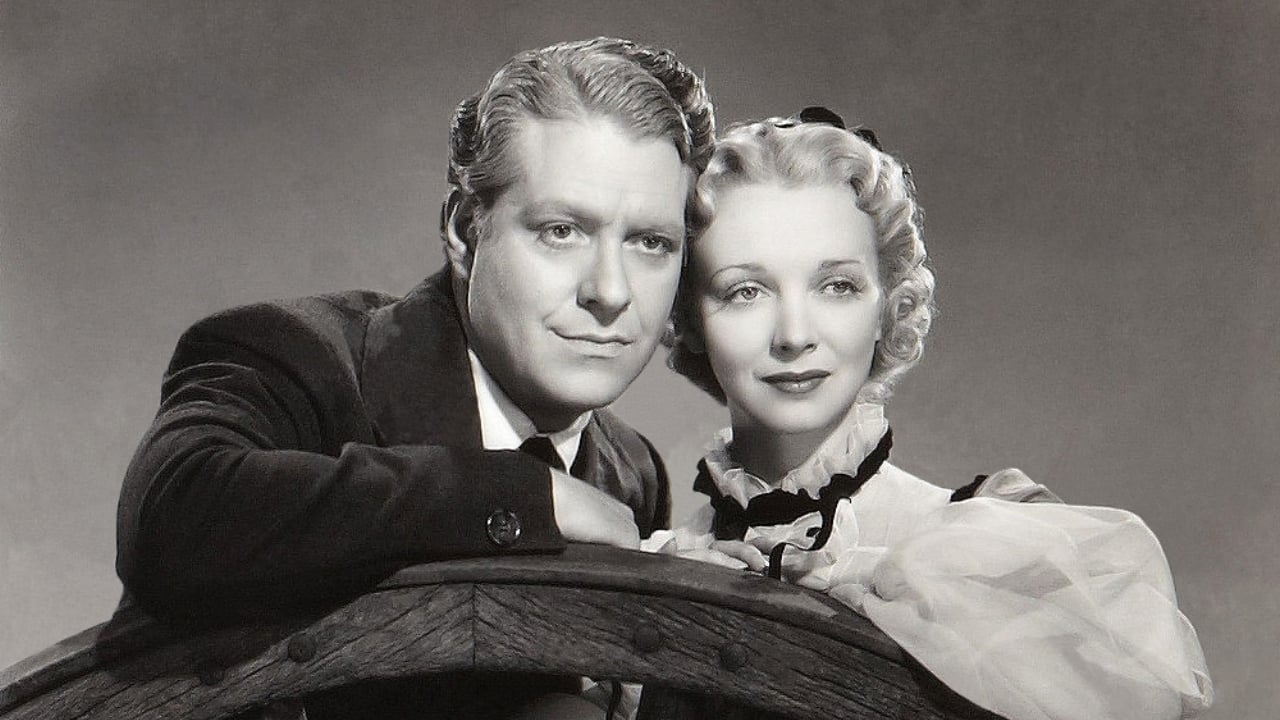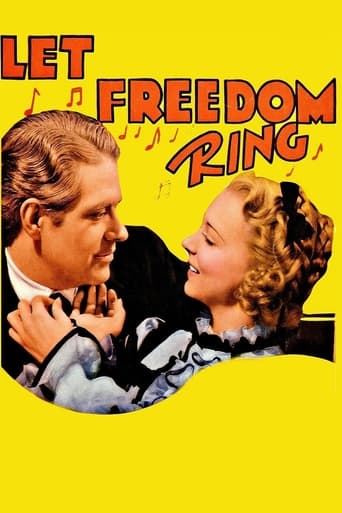SincereFinest
disgusting, overrated, pointless
Dynamixor
The performances transcend the film's tropes, grounding it in characters that feel more complete than this subgenre often produces.
Micah Lloyd
Excellent characters with emotional depth. My wife, daughter and granddaughter all enjoyed it...and me, too! Very good movie! You won't be disappointed.
Jenna Walter
The film may be flawed, but its message is not.
David Ecklein
It's Nelson Eddy again, but this time without Jeanette - in an unusual Western musical! "Let Freedom Ring" (1939) is finally available on DVD. It is a patriotic action picture based on the 19th century struggle of farmers against the railroads. History with distant echoes where I grew up in the Midwest, from stories I heard and reflected by novelists such as Frank Norris with "The Octopus" and "the Pit". First was land grabbing by nefarious means as dramatized in the film. Later, of course, came the gaming of freight rates to rob the farmers even further, into the 20th century. See Nelson Eddy lead the charge against Edward Arnold, notorious villain from Wall Street, and his hired thug Victor McLaglen, who exploit the immigrant railroad workers and homestead farmers alike! "Wall Street" is mentioned pejoratively three times; this would never happen in today's ideologically sanitized Hollywood. Otherwise, a wholesome Ben Hecht script with Arson! Fistfights! Gunfire! Noble Nelson in fine voice with codger Lionel Barrymore, comic Charles Butterworth, and comely Virginia Bruce. Plus many others in a star spangled film.
bkoganbing
Let Freedom Ring was probably made with the best of intentions, but it sends out a curious mixed message in the final product.The folks at a western town where the railroad is coming through are overwhelmed by the arrival of immigrant railroad workers, working on the railroad being financed by robber baron Edward Arnold. There are a few ranchers and farmers whose land stands in the railroad's path and these folks are dealt with summarily by Arnold's hired men. One man who won't give in is Lionel Barrymore whose son is coming home from Harvard a lawyer and ready to take up the rancher's cause.Only Nelson Eddy decides the best way to fight is to go Zorro on the bad guys. But other than Charles Butterworth no one knows he's the Wasp (a very interesting choice of names by the way). What Arnold's done is used the tried and true methods of the political bosses of the east, getting the immigrants to vote. Nelson's idea is simple, if the immigrants only knew the truth about what a bad guy Arnold is, they'll vote with the original settlers and knock out the alien urban political machine in their midst. He kidnaps newspaper editor Raymond Walburn and takes him and the press to a mountain cave where some subversive newspapers are printed and distributed.The railroad workers are a real mixed bunch of immigrants, not the Irish working west or the Chinese working east as history has it. It's a real United Nations working on Arnold's railroad. The workers are kept in line by foreman Victor McLaglen and Nelson has the unenviable task of beating some sense into him like John Wayne did in The Quiet Man.Of all the films that starred Jeanette and Nelson and they certainly have come down in history as a duo, this was the worst of what they did at MGM. Nelson is about to be hanged along with Barrymore for crimes that are undefined at best, but certainly nothing worth being hung for. And Virginia Bruce who plays the Nelson's girlfriend saves the day with a rendition of My Country Tis of Thee that the immigrants join in with. In the face of a revolt by his paid for immigrant voters, Arnold quite rationally packs up and leaves town to build his railroad somewhere else.I kid you not, that's the ending here. Just what is the message, vote with the settlers and lose your jobs with Arnold? But somehow you'll get by here? I do wonder some times if 20 years from after the incidents of this film take place and the town as settled into a sleepy backwater of the west while some towns where the railroad has come through that are now cities, that the good citizens of that town haven't rethought about what Nelson Eddy did. If they did they're probably running him out on a rail.Nelson is of course in good voice and has a variety of concert and popular pieces to sing including a ballad to the immigrants written by Sigmund Romberg, Where Else But Here. The song is a heartfelt tribute from an immigrant who did make good in his adopted country. Too bad it didn't have a better venue.The almost platinum blonde Virginia Bruce I'm sure is dubbed here. And I'm sure Jeanette MacDonald was just as happy she wasn't accompanying Nelson on this trip west.
theowinthrop
LET FREEDOM RING is a well intentioned musical comedy about the post-Civil War age of the robber barons. So, who should play a smiling, unscrupulous business tycoon but that most realistic one Edward Arnold - in the year that he also played Boss Jim Taylor in MR. SMITH GOES TO WASHINGTON (and shortly before his fascist minded tycoon in Capra's MEET JOHN DOE). Only his attempt to dominate a small western town that is in the way of his planned railroad somehow comes to the attention of the U.S. Government, who send Nelson Eddy as a special agent to unite the townspeople to confront and defeat the nefarious Arnold. This should tip one off as to this being a Hollywood fantasy. The government in Washington in the 1870s would not only have not bothered sending any agent out to do this, but it would have sent word to Arnold (with palm outstretched) that it was there to assist him in his land grabbing activities. If you doubt me, read Allan Nevins' biography of Stuyvesant Fish, President Grant's Secretary of State - the most honest man in his government. Nevins chronicles the series of scandals that tarnished Grant's two terms, several dealing with railroads.It is a disparate group that Eddy has to bring together. Besides his love interest (Virginia Bruce) there is the Mayor (Guy Kibbee), the local newspaper editor (Raymond Walburn), the railroad's leading bully boy (a misguided one, as it turns out) Victor MacLaghlan, and such strong, firm citizens as Charles Butterworth. Yet, at the end of this cute little film Eddy manages to get the townspeople united against Arnold and his moneyed army. They sing their defiance in Edward's face. Watch the conclusions of this bizaare movie closely. Arnold is not defeated at the end...he justs realizes he has miscalculated in that he picked a route that goes through a town full of lunatics. He shakes his head in bewilderment, picks himself up (probably realizing that the route through some more promising town is better), and leaves. Knowing how smart Edward was, he probably did build his railroad through a better route after all!
rsoonsa
Scenarist Ben Hecht's tract to ethnic toleration does not lack the production values and quality of acting necessary for its artistic success. Within the format of a Hollywood-style Western, it is an easy task for Hecht to insert his typical hyperbole in the form of some truly crimson prose directed against big business represented by expanding railroad interests. Edward Arnold gives a solid performance as Jim Knox, a railway plutocrat who is determined to manipulate and exploit a polyglot force of European immigrant workers, led by their rough and ready Irish foreman, played to the hilt by Victor MacLaglen in this post-War Between the States musical melodrama. How to oppose Knox' land grabbing is the plight of a small coterie of settlers led by Tom Logan and his recently Harvard-graduated son Steve, portrayed by Lionel Barrymore and baritone Nelson Eddy. Reliable Jack Conway directs with proletarian emphasis, featuring closeups of seamed and craggy-faced railroad laborers, whose basic needs are apparently implemented whenever the sturdy Eddy bursts into song. Eddy employs the method of a clandestine newspaper to undermine the plans of the villainous capitalist Knox, working hand-in-hand with a sidekick, acted very nicely by the extraordinary ad lib performer, Charles Butterworth, whose nonpareil timing is a delight in his every scene. This is the first appearance of the seasoned Eddy without an equal singing partner, and he proves more than capable of carrying the show, although he is joined briefly during one number by his romantic interest, the talented and beautiful Virginia Bruce. Without question a disputation against capitalist profiteering, LET FREEDOM RING is even more a rousing entertainment, knitted with wonderful music, a top-flight cast, and neatly crafted direction.

